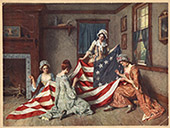Libraries, University of Nebraska-Lincoln
ORCID IDs
Document Type
Archival Material
Date of this Version
1706
Abstract
There were Africans in New England before there were Puritans there, and by 1700 they numbered about 1,000 out of a total population of 90,000. Roughly half of them lived in Massachusetts, and were concentrated in Boston and the coastal towns. Puritans actively participated in the trafficking of enslaved persons, importing Africans from the West Indies and sometimes selling native American prisoners overseas.
Cotton Mather’s household contained enslaved Negro servants, and his congregation at the Second (or North) Church included both merchants of slavery and persons of African descent. The pamphlet reprinted here appeared in 1706 without his name, but his authorship of it was generally known. It calls on those who held people in slavery to educate their “servants” in the Christian religion, to treat them justly and kindly, and to accept them as spiritual brethren. It includes two catechisms and other instructional materials. It advances both spiritual and pragmatic arguments: the Christian has a moral responsibility for the souls of those in danger, and the Christianized servant is more profitable to his master.
Mather’s style in this work is (for him) unusually plain-spoken and direct. He quotes only one church father (Chrysostom), one classical philosopher (Cato), and one modern historian (Acosta). Moreover, his language seems particularly fresh, almost contemporary: “Man, Thy Negro is thy Neighbour. … Yea, if thou dost grant, That God hath made of one Blood, all Nations of men, he is thy Brother too.”—and, at another point, “… say of it, as it is.”
The electronic text presented here was transcribed from the first edition, printed at Boston in 1706. A very few notes have been included and also a list of typographical errors corrected.
Included in
African American Studies Commons, American Studies Commons, Ethics in Religion Commons, History of Religion Commons, Religious Education Commons, United States History Commons


